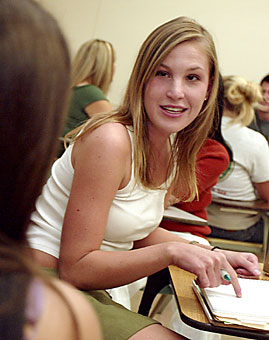 |
|
KEVIN B. KLAUS/Arizona Daily Wildcat
|
Family studies and consumer sciences junior Kathryn Weber discusses plans for the Tucson Meet Yourself festival last night. Weber is part of a UA folklore class which will be giving a presentation on the history and traditions of the university.
|
|
|
By Jesse Lewis
Arizona Daily Wildcat
Thursday, October 7, 2004
Print this
A UA folklore class will give a presentation about UA history and traditions at this weekend's annual Tucson Meet Yourself festival downtown.
It is the first time in the festival's 31-year history the UA will contribute a presentation.
The English class, Introduction to Folklore, will feature presentations on Greek Life, The How and Why of Almost Everything at the UA and some of the UA's best ghost stories.
James "Big Jim" Griffith, a retired folklorist and 19-year UA employee, co-founded the Tucson Meet Yourself festival with his wife and another woman in 1974 to unite and display the many cultures of Tucson.
Griffith received his bachelor's, master's and doctoral degrees from the UA.
In the past, the festival featured music, games, dances and foods from different Tucson cultures.
"(We founded the festival) simply because there was a lot of wonderful stuff happening in the small community of Tucson, and there wasn't really a good forum to share all this stuff," Griffith said.
Maribel Alvarez, assistant research professor and folklorist, teaches the intro to folklore class, and Griffith decided this would be a good year to introduce the culture of the UA at the festival.
"The UA is, in fact, its own community in Tucson," Griffith said.
The class was split into four groups: ghost stories and history, school spirit, greek life and publicity.
The groups will present UA traditions such as Wilbur and Wilma Wildcat and the issue of tortilla throwing at commencement ceremonies.
The ghost stories group will tell ghost stories in a dark tent as part of their presentation.
Most of the UA history will be geared toward kids, with activities like face painting and school spirit games.
"It is necessary to involve kids because this is a family event, in order for families to want to attend. There has to be some entertainment for the kids who may not understand the issue of culture in our community," said Lauren Lund, journalism junior and class member.
Jonathan Hatchell, a sociology junior, is the leader of the school spirit group which will answer the question "Why the 'A'?"
The "A" was placed on Sentinel Peak on March 4, 1916, after a two-year win by the football team against Pomona College in California. A player and civil engineering student at the time thought it would be a good class project to survey the mountain and design the location of the "A" Hatchell said.
In November 1915, students began clearing the area of shrubbery and cactus, digging trenches and using rock mixed with mortar and water, which was hauled to the top of the peak and whitewashed.
The final "A" stood 106 feet tall and 70 feet wide.
Tucsonans thereafter referred to Sentinel Peak as "A" Mountain, though it still says Sentinel Peak on most maps.
The entire project cost $397, which was generated from student donations.
Kathryn Weber, family studies and consumer sciences junior, is the leader of the Greek Life group, who is trying to gather a panel of greeks.
"We hope to have a panel of fraternity and sorority members of each grade level who will speak about their experiences as greeks, their reasons for joining and how it affected their college experience," Weber said.
The UA Turkish Club, Wu Shu Martial Arts Club, pep band, cheerleaders and alumni pep band will also perform.
Alvarez said the class goal is to teach the many non-native Tucsonans about the UA's relationship with the city.
"This represents UA's effect on Tucson; it represents all these people that move to Tucson just for school," Weber said.
Alvarez said the UA is the social society for most students, and it is all many students know of Tucson. She said the festival is a way of introducing those students to Tucson and Tucson to the UA.
"Students come from all over the world and bring their traditions with them, the world they know through the university is the world they experience," Alvarez said.
Student participation in the festival is a means of studying folklore hands-on, Alvarez said.
"Through readings on meaning and locations of cultures, students are understanding all manifestations of cultural meanings and social dynamics," she said.
The Tucson Meet Yourself festival begins downtown tomorrow at Presidio Park, near the Tucson Pima Public Library and City Hall. It continues through Sunday. Admission is free.
